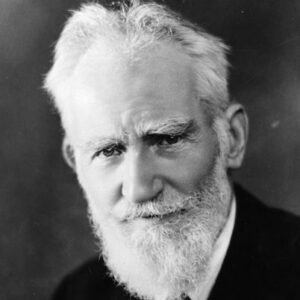Books By George Bernard Shaw
- Immaturity (1879)
- The Irrational Knot (1880)
- Love Among the Artists (1881)
- Cashel Byron’s Profession (1882)
- An Unsocial Socialist (1883)
- The Philanderer (1893)
- Mrs. Warren’s Profession (1893)
- Arms and the Man (1894)
- The Man of Destiny (1897)
- You Never Can Tell (1898)
- Candida (1898)
- The Devil’s Disciple (1899)
- Captain Brassbound’s Conversion (1900)
- Man and Superman (1903)
- John Bull’s Other Island (1904)
- How He Lied to Her Husband (1904)
- Major Barbara (1905)
- The Doctor’s Dilemma (1906)
- Getting Married (1908)
- The Shewing-Up of Blanco Posnet (1909)
- Press Cuttings (1909)
- Misalliance (1910)
- The Dark Lady of the Sonnets (1910)
- Fanny’s First Play (1911)
- Androcles and the Lion (1912)
- Overruled (1912)
- Pygmalion (1913)
- Great Catherine (1913)
- The Music Cure (1914)
- O’Flaherty V.C. (1917)
- Heartbreak House (1919)
- Back to Methuselah (1921)
- Saint Joan (1923)
- The Apple Cart (1928)
- Too True to Be Good (1932)
- On the Rocks (1933)
- The Millionairess (1936)
- The Simpleton of the Unexpected Isles (1936)
- Geneva (1938)
- In Good King Charles’s Golden Days (1939)
- Buoyant Billions (1948)
- Farfetched Fables (1950)
- Shakes Versus Shav (1951)
- Why She Would Not (1955)
- Shaw’s Music (1981)
About George Bernard Shaw
 George Bernard Shaw, born on July 26, 1856, was an Irish playwright, critic, polemicist, and political activist. He is celebrated as one of the most influential playwrights of the late Victorian and early modern periods. Shaw’s literary career spanned several decades, during which he produced an extensive body of work encompassing plays, essays, novels, and criticism.
George Bernard Shaw, born on July 26, 1856, was an Irish playwright, critic, polemicist, and political activist. He is celebrated as one of the most influential playwrights of the late Victorian and early modern periods. Shaw’s literary career spanned several decades, during which he produced an extensive body of work encompassing plays, essays, novels, and criticism.
Shaw’s early life was marked by financial struggle, but his voracious appetite for reading and self-education laid the foundation for his future success. He began his career as a critic, writing reviews and essays on a wide range of topics, including literature, music, and theater. His sharp wit and incisive commentary soon garnered attention, establishing him as a prominent voice in London’s intellectual circles.
It was Shaw’s work as a playwright, however, that brought him lasting fame and acclaim. His plays, characterized by their wit, social criticism, and unconventional characters, challenged Victorian norms and explored complex social and political issues. Shaw’s most famous works include “Pygmalion,” “Man and Superman,” and “Saint Joan,” among many others.
Beyond his literary achievements, Shaw was also a committed socialist and advocate for social reform. He was actively involved in various political causes throughout his life, campaigning for issues such as women’s rights, workers’ rights, and education reform. His socialist beliefs were reflected in many of his works, which often critiqued the inequities of capitalism and championed the rights of the working class.
Shaw’s legacy continues to endure, with his plays being regularly performed and studied around the world. He was awarded the Nobel Prize in Literature in 1925 for his contribution to literature, making him the only person to have been awarded both a Nobel Prize and an Academy Award (which he received for his work on the film adaptation of “Pygmalion”). George Bernard Shaw remains a towering figure in literary history, celebrated for his wit, intellect, and unwavering commitment to social justice.

